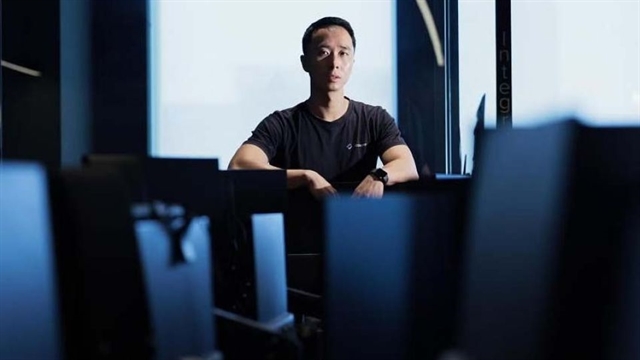 Life & Style
Life & Style

The five-year-old Singapore company is making a pitch for its technology to fight everyday scams through the issue of verifiable credentials, first used during the pandemic to inspire confidence in cross-border travel.

|
| Accredify aims to prevent scams and fraud in e-commerce, ticketing and news dissemination, says its CEO and co-founder Quah Zheng Wei. The Straits Times Photo |
SINGAPORE – A local start-up that allowed healthcare firms to issue tamper-proof memos essential for travel during the COVID-19 pandemic now wants to take on the world of fake concert tickets and academic certificates.
In late March, Accredify received a shot in the arm with funding from the venture firm of American digital identity specialist Okta. The undisclosed sum from Okta Venture will pave the way for Accredify to expand globally, including reaching Okta’s base of 18,000 enterprise customers, with its new mission.
The five-year-old Singapore company is making a pitch for its technology to fight everyday scams through the issue of verifiable credentials, first used during the pandemic to inspire confidence in cross-border travel.
“One of the next steps for us is to solve the big problems that touch citizens’ lives: To prevent scams and fraud in e-commerce, ticketing and news dissemination,” Quah Zheng Wei, co-founder and chief executive officer of Accredify, told The Straits Times.
In 2021, Accredify enabled healthcare providers here, including Parkway Laboratories and Raffles Medical Group, to issue tamper-resistant digital health memos after fake ones were spotted in Europe.
These memos – whose authenticity can be easily verified through QR code scanning – were needed to safely restart travel and facilitate migrant workers’ re-entry into the workforce following COVID-19 outbreaks in their dormitories.
Accredify’s technology is based on blockchain, a searchable digital ledger. Its key selling point is that transaction information recorded on the blockchain cannot be forged, allowing ownership of, say, a digital work of art or non-fungible token (NFT), to be easily transferred and validated.
Similarly, the ownership of digital goods such as concert tickets can be encrypted in a blockchain, and validated when resold. Scammers will not be able to sell what they do not have, or multiple copies of the same ticket.
It is a nifty tool for e-commerce platforms, healthcare providers, academic institutions, traders and governments to provide public assurance through the issuing of verifiable documents and credentials.
The Singapore police said that between Jan 1 and March 12 in 2024, at least 1,551 victims had fallen prey to e-commerce scams involving concert tickets, with total losses amounting to at least $737,000. The bulk of these tickets were for Taylor Swift’s best-selling Eras tour in Singapore from March 2 to 9.
Popular e-marketplace Carousell could not control scammers preying on desperate fans in the resale market on its platform. In an unprecedented move on February 23, Carousell suspended the American pop star’s concert ticket sales across its six markets in Singapore, Hong Kong, Indonesia, Malaysia, the Philippines and Taiwan.
“Carousell didn’t have to resort to such an extreme measure,” said Quah, whose current clients are mainly in the healthcare and education sectors.
London-based ticketing software start-up Dice is a keen rival in the concert ticketing space. Dice provides e-tickets that must be activated in-app prior to being scanned. The QR codes are activated only two hours before the event. Dice’s investors include SoftBank Vision Fund, Nest co-founder and iPod inventor Tony Fadell, as well as French billionaire entrepreneur Xavier Niel.
“Trust is a universal problem,” said Ben Goodman, senior vice-president and general manager of Okta Asia-Pacific and Japan.
He noted that Accredify’s tools are a natural extension of Okta’s platform-agnostic developer tools that support authorisation and authentication. “Verifiable credentials logically then can become a vital component of authentication going forward,” he said.
The Series A extension by Okta Venture comes after Accredify secured US$7 million (S$9.4 million) in financing in April 2023, co-led by iGlobe Partners and SIG Venture Capital, with participation from Pavilion Capital and Qualgro.
In 2021, Accredify also raised US$2 million led by venture capital firm Qualgro to combat the rising problem of fake degree certificates in the education sector.
Today, the start-up counts more than 900 organisations in Asia and Europe as clients. They include Singapore Management University, NTUC LearningHub, Raffles College of Higher Education, London School of Business and Finance, and Brickfields Asia College.
How verification is done
The Accounting and Corporate Regulatory Authority (Acra) of Singapore is one of Accredify’s latest customers. Acra’s free trustBar online service, launched in March 2023, lets users verify if Acra-issued business profiles and business registration certificates have been tampered by scanning a QR code on the certificate.
A green tick shows that the document is real. The authentic copy will also be displayed on screen to allow the checker to verify any details. A red cross means the document is fake.
Acra’s move comes amid frequent fraud in various sectors.
In January, Singapore artificial intelligence (AI) start-up Vizzio Technologies’ founder Jon Lee made news for faking his Cambridge doctorate. The lie went as far as China, where media articles repeated his fraudulent credentials.
Over two decades ago, he lied about his awards and fellowships from the Massachusetts Institute of Technology and Stanford University under a different name. In 2001, he was fired from Singapore firm Elipva, where he served as chief technology officer under the name Dennis Lee.
In another scandal in 2021, 23 foreigners were found to have falsely declared their educational qualifications from India’s Manav Bharti University in their work pass applications in Singapore. The Indian university had reportedly sold 36,000 fake degrees across 17 Indian states over 11 years.
Subsequently, two Indian nationals were jailed, and 19 others were permanently barred from future employment in Singapore for using fake degrees to apply for work passes.
Separately, a Nanyang Technological University dropout forged a bachelor’s degree in engineering certificate from the institution and duped multiple firms into hiring her from 2005 to 2021.
Her offences came to light only when her most recent employer, Walt Disney, sent her fake certificate to be validated by a third-party vendor shortly after she was hired in 2021.
As part of a national effort to thwart forgery, all graduating students in Singapore have been issued digital verifiable certificates since 2019. Verification can be done by potential employers on the OpenCerts portal developed by GovTech. Any modified certificate will fail validation and show up as having been tampered with.
The initiative covers academic certificates from the N, O and A levels, all the way through to other post-secondary qualifications such as polytechnic diplomas and university degrees, as well as Singapore Workforce Skills Qualifications.
Deep fake images, videos
An emerging battlefield is the area of fake images and videos, where crooks have received immense help from generative AI tools.
In February, CNN reported that a finance worker at a multinational firm in Hong Kong was duped into paying out US$25 million to fraudsters. The elaborate scam saw the worker conned into attending a multi-party video conference call with deep-fake recreations of the company’s UK-based chief financial officer and other staff.
The industry has so far rallied around watermark technologies to identify AI-generated content. But their developments are still nascent. A basic implementation involves pasting a watermark on top of an image or a video footage, but the watermark can be easily edited out. Watermarking also puts the burden on consumers to check the provenance of what they see online, which does not always happen.
Another form of watermark records the provenance of the image or video on the blockchain. But editing photos and videos may not necessarily be for deception – unlike altering certificates, memos or tickets. Some image and video manipulations are considered to be skilful artwork.
For instance, zooming in on a subject in a picture or video, cropping out certain details or changing colour could alter perception or remove contextual information. But zooming, cropping and colour editing are also important creative tools to enhance the framing or appeal of a picture or video.
“Indeed, we don’t always use negative words like manipulated or tampered on edited photos and videos as the edits could enhance the visuals and tell a sharper story,” said Quah, noting that Accredify is still researching ways to help people identify fake images and videos. The Straits Times/ANN




